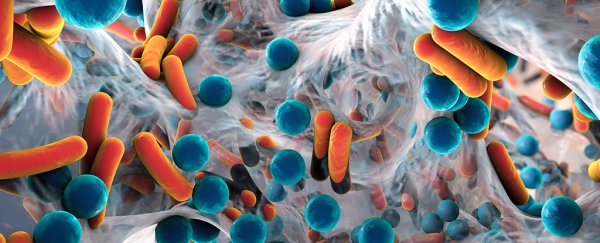Researchers have found yet another reason to think the symptoms of Parkinson's disease could be a consequence of the type of bacteria living in our gut.
Such discoveries could help us use changes in our gut bacteria to not only diagnose the debilitating disorder earlier, but potentially create better targeted treatments.
Once referred to as 'the shaking palsy', Parkinson's disease is mostly characterised by tremors and a loss of fine motor control, later progressing into dementia, difficulty walking, and sometimes chronic depression.
In most studies on the condition the brain has been the focus, with the blame for the disease primarily falling on the death of cells in a part of the brain called the substantia nigra – a lump of tissue responsible for movement and reward.
In recent years, however, scientists studying the root cause of Parkinson's disease have shifted their attention from the nervous system onto the denizens of our gut, identifying significant differences in the types of bacteria living in the guts of those with the condition and those who don't.
Now a team of scientists at the University of Alabama at Birmingham in the US have contributed yet another piece of evidence tying Parkinson's disease with our personal community of microorganisms – or microbiota.
"We know that a well-balanced gut microbiota is critical for maintaining general health, and alterations in the composition of gut microbiota have been linked to a range of disorders," said researcher Haydeh Payami.
The researchers analysed samples of gut microbes from 197 patients with Parkinson's disease from Seattle, New York, and Atlanta – representing three distinct regions around the US – and compared their species and functions with samples taken from 130 individuals without the condition.
Not only did the results show marked differences in the numbers and types of bacteria between the two groups, they also noticed a difference in the metabolism of various medications.
In other words, either the various drugs taken by those with Parkinson's disease were also having a unique impact on the bacteria, or their microbiota was affecting how their bodies responded to pharmaceutical treatments.
Microorganisms in our digestive system have been found to play an important role in breaking down so-called xenobiotics – chemicals which aren't usually expected to be present inside an organism.
This includes not only the medications used to treat conditions such as Parkinson's disease, but chemicals in their environment such as pesticides and herbicides.
Given farmers seem to be more prone to Parkinson's disease than the general population, thanks possibly to the chemicals they use, it's possible that the bacteria in their guts could be their body's first casualties.
"It could be that, in some people, a drug alters the microbiome so that it causes additional health problems in the form of side effects," Payami said.
"Another consideration is that the natural variability in the microbiome could be a reason some people benefit from a given drug and others are unresponsive. The growing field of pharmacogenomics – tailoring drugs based on an individual's genetic makeup – may need to take the microbiome into consideration."
One of the early symptoms of Parkinson's disease is constipation, so correlations such as these shouldn't come as much of a surprise.
As with many things in science, however, it's hard to tell if a difference in microbiota is a cause of Parkinson's disease or an effect.
Last year researchers at the Californian Institute of Technology found mice who had been engineered to be susceptible to Parkinson's disease developed less severe symptoms if they were raised in sterile conditions.
Injecting microflora from the guts of human Parkinson's patients led to a rapid deterioration, suggesting the type of microbes could be at least partially responsible for the severity of the symptoms.
However it's clear the relationship is a two-way street, making for a complex interaction which demands further study.
We're only beginning to learn how important our body's tiny citizens are, but as we find more links like these, we open up new horizons to treating or even preventing diseases such as Parkinson's.
This research was published in Movement Disorders.
